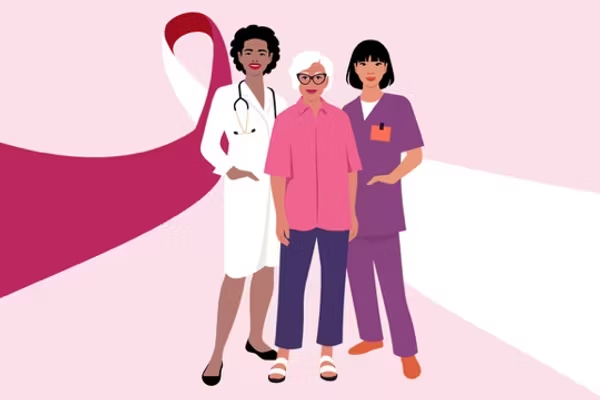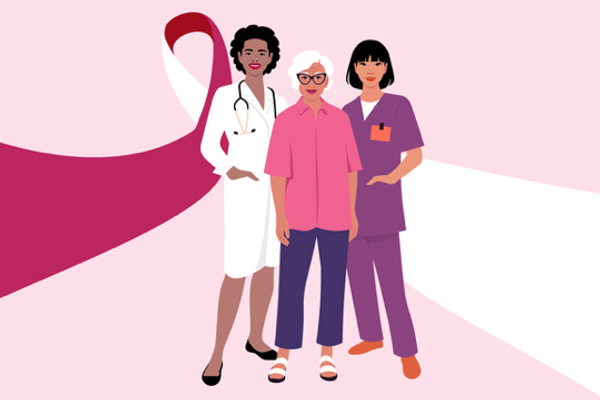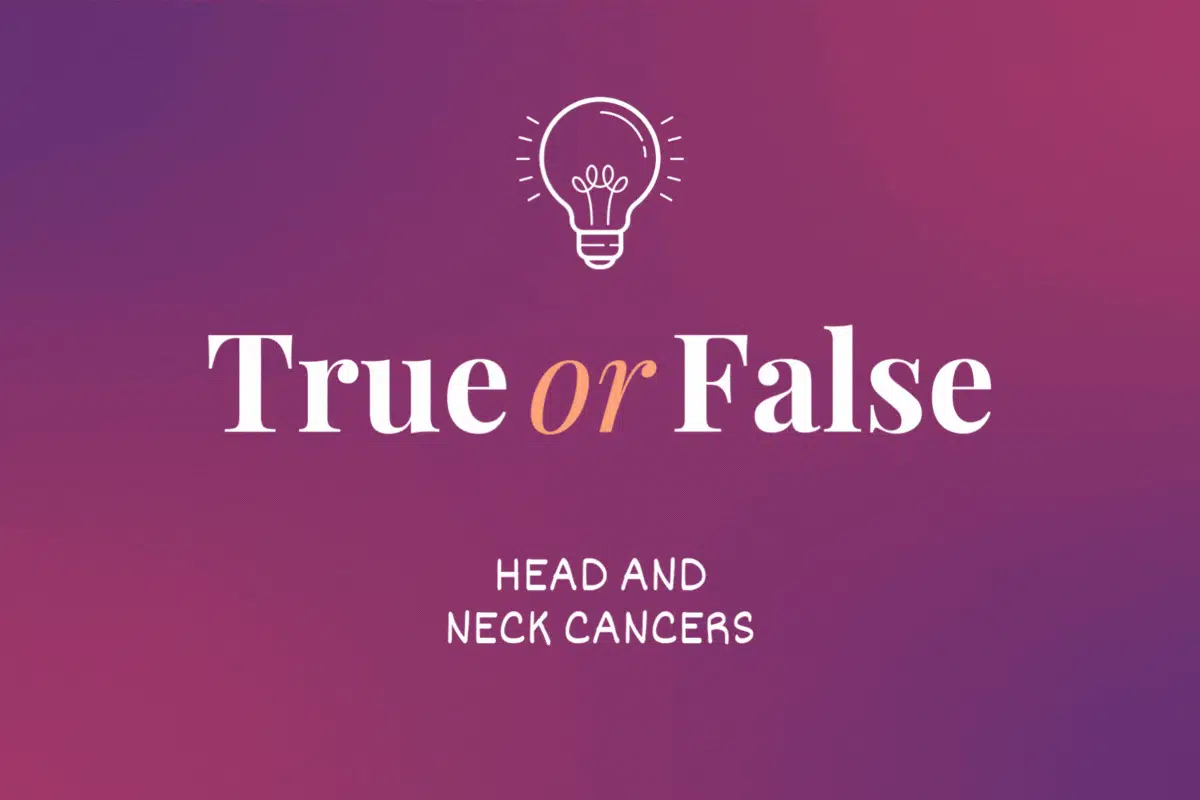This resource was created with support from Merck.
The Experts:
Dr. Eleni Rettig is a head and neck cancer surgeon with research interests in human papillomavirus-positive oropharynx cancers, including epidemiology, natural history, screening, risk stratification and surveillance; as well as other epidemiologic and clinical aspects of head and neck cancer. She trained in epidemiologic and clinical research methods during a two-year T32 research training fellowship that she completed as part of her surgical residency. Her clinical activity includes the surgical treatment of head and neck tumors, transoral robotic surgery for oropharynx tumors and microvascular reconstruction of the head and neck. She is also involved in the clinical education of the Harvard Otolaryngology-Head and Neck Surgery residents.
What is head and neck cancer?
Head and neck cancer, as a very broad term, refers to any malignancies that are kind of above the clavicles, excluding the brain and the eyes. Everything else we often refer to as head and neck cancer. More specifically, the term head and neck cancer can be applied to just mucosal malignancies, so tumors of the lining of the nose and the mouth, the back of the throat down to the voice box, and that's often what we describe as head and neck cancer. Other cancers that head and neck cancer surgeons would see would include thyroid cancers and also skin cancers, and many of those types of cancers can spread to lymph nodes in the neck, and so we manage the neck lymph nodes as well.
What are the symptoms of head and neck cancer?
Symptoms that may be concerning for head and neck cancer would include a neck mass or neck lump that has not gone away after a few weeks. Other signs would include a sore or ulceration or mass or nodule in the mouth in the oral cavity or in the tonsil, which you can see through the mouth. You can see the palatine tonsils through the mouth. Throat pain that doesn't go away, ear pain that doesn't go away, new numbness or new weakness, or anything along those lines. Any symptom like that that is concerning to you that doesn't go away after a few weeks should really be checked out.
What are the risk factors for head and neck cancer?
The most important risk factors for head and neck cancer are smoking and tobacco use, and now also HPV.
What is HPV’s role in head and neck cancer?
HPV now causes a growing majority of head and neck cancers of the oropharynx, and the oropharynx is a specific site within the head and neck, and that includes the palatine tonsils, which are at the back of the throat, and also the lingual tonsils, which are the back of the tongue. And you can't see the lingual tonsils through the mouth, so the oral pharynx includes all of those, different areas, so essentially the back of the throat. So HPV causes over 70% of the oropharynx cancers in the U.S. now and also in some other developed countries, and in some areas, including at our own center at Dana-Farber, we see HPV in you know, 90% or more of the oropharynx cancers that we see. This is important because HPV-positive oropharynx cancers have a significantly better prognosis than HPV-negative head and neck cancers. So prior to about 2000, most oropharynx cancers were caused by smoking and drinking, which is similar to other head and neck cancers. However, around the year 2000, we started to see an increase, in the number of oropharynx cancers that were among younger individuals who didn't have a strong history of smoking, and these patients also tended to do better after treatment, so their tumors responded better to treatment. And we learned, that most of these cancers were caused actually by HPV, and the proportion of oropharynx cancers that is caused by HPV has increased since that time.
Is there a difference between HPV-positive and HPV-negative patients, and how you manage their treatment?
Currently we don't treat HPV-positive and HPV-negative disease differently, although this may change in the future. We know that HPV-positive tumors respond better to treatment than HPV- negative tumors. We also know that the treatment for head and neck cancer can be difficult, and has a lot of short-term and long-term side effects. And so there have been a number of trials — some are still underway, others have been reported recently, looking at whether we can decrease the treatment for HPV-positive tumors while still maintaining excellent survival outcomes. The overall survival at five years for HPV-positive oropharynx cancers is around 80–85%, compared to HPV-negative oropharynx cancers, where the survival is closer to 50 or 60%, and so we're trying to maintain those excellent survival outcomes while decreasing the long-term toxicities for these patients, especially since the number of these patients is increasing, the number of survivors of HPV-positive or pharynx cancer is increasing. The studies that we have so far have shown some promise, in different approaches to de-intensifying treatment for HPV-positive disease, but we still do not treat these patients differently outside of the context of a clinical trial.
Is my partner at risk for HPV-positive head and neck cancer if I have HPV or HPV-positive cancer?
Yes, a slightly increased risk, and much of that is mostly due to shared exposures. So any HPV that you know you have, your partner probably already has. And so we don't really recommend any change in behavior necessarily with your partner if you've been together for a while. The studies that we have show that the partners of patients with HPV-positive oropharynx cancer do not have a significantly increased prevalence of oral HPV infection, although we have seen in large meta-analysis that patients or individuals who have a partner with any HPV-related malignancy do have a slightly increased risk of having another HPV-related malignancy, and that's only about a 1 to 3% increase in risk, and as I mentioned, is mostly due to a history of shared exposures.
Why is oropharyngeal cancer, a type of head and neck cancer, becoming more common?
Oropharynx cancer is becoming more common, we think, because most of them are now caused by HPV, and HPV is a sexually transmitted infection. And HPV-positive oropharynx cancer is strongly tied to oral sexual behaviors in particular. So we believe that the increase in incidence of HPV-positive oropharynx cancers is due to larger changes in societal norms for sexual behaviors in the 1950s and 60s, and we're starting, you know, starting to see the consequences of that, around the, you know, the year 2000, when the incidence of HPV-positive disease started to go up. And so we think it's largely attributed to changes, in sexual practices as a whole.
What should patients expect from a physical exam for head and neck cancer?
A head and neck exam by an otolaryngologist or a head and neck surgeon would entail examination of the ears, the nose, the mouth, the facial movement, facial sensation and the neck, and then also often will include a fiber optic examination of the nose and throat, and that's a small fiber optic camera that's inserted through the nose and used to go down and examine, the voice box in the back of the tongue — so places that you can't see through the mouth. Often that's done under a little bit of topical anesthesia, so a numbing spray into the nose.
What has been the most important piece of advice you’ve shared with someone that has been diagnosed with head and neck cancer?
For my patients who have been diagnosed with head and neck cancer, I think it's very important for them to know that the treatment can be difficult and it can last a while. I often tell them that they should expect to spend the next 3 to 6 months really getting treated and recovering from treatment for their head and neck cancer, but that it will get better. We do know that quality of life will go down around the time of diagnosis and treatment, but our studies also show that quality of life improves in the months following treatment, and so there may be some things that they have to get used to as a new normal, but that you know wounds tend to heal and things do tend to get better, after treatment is finished. And of course we're there to help, the entire time.
- A Rare Head and Neck Cancer Taught Me How to Be My Best Advocate ›
- Clinically Speaking: Questions to Ask Your Healthcare Provider About Head and Neck Cancer ›
- Barriers to Care: Head and Neck Cancer ›
- Understanding Head and Neck Cancer ›
- Fast Facts: What You Need to Know About Head and Neck Cancer ›
- Coping With the Emotional Impact of Head and Neck Cancer ›
- Do Ethnicity and Race Increase Risk for Head & Neck Cancers? - HealthyWomen ›
- Reduce el riesgo de cánceres de cabeza y cuello - HealthyWomen ›
- Reduce the Risk of Head and Neck Cancers - HealthyWomen ›
- Symptoms of Head and Neck Cancer - HealthyWomen ›
- Síntomas de cáncer de cabeza y cuello - HealthyWomen ›







